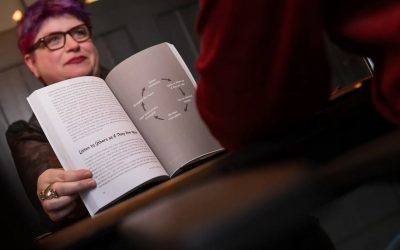Self-Reflection Gives Us The Chance To Be Good But Different
Good but different.
When we take time for self-reflection and gain a firm understanding of who and how we are in the world, we can do something different.
Good…but different.
We all come with strengths and weaknesses, habits and comfort zones. We all have limitations, biases, and inexperience.
It’s with self-reflection and noticing the behaviors and responses of others – that we can decide what of ourselves to keep, challenge, or change.
To best connect, matter, and communicate with others, it is up to us to value both our patterns and those of others.
When we take time for this exercise, we’re better able to advocate for social justice.
Where is our individual “good”…?
We start with our “party-of-one” work and then look to “them” to help us determine which responses we deem to be good.
Perhaps our good is in line with what we think or feel it should be, or maybe not.
Perhaps we have a lot of self-work to do before we can improve our connection and communication with others.
The key is to believe that we are enough.
Enough doesn’t mean perfect.
We can trick ourselves into thinking we have to be perfect in every interaction, in every moment. And we can freeze.
Paralysis by analysis…
But “enough” constitutes the base level of what is needed to proceed.
Throughout your development, there will be improvements made, unavoidable mistakes, and better versions out there. And I’m suggesting that, in the meantime, let’s do the best we can with what we have some of the time.
That is more than enough.
And remember that as soon as we feel competent, we must start all over and repeat the process to uncover more areas of work. That’s where growth happens.
When self-reflection isn’t your thing…
If self-reflection isn’t where you want to start, try examining times when you procrastinate.
Pay attention for a week and see if you can identify what, when, and how you procrastinate. Leave judgment aside…just take note of a habitual behavioral pattern.
Procrastination tends to occur because we lack the time, means, energy, or passion to complete our tasks. We fail to act because we talk our way out of it, feel inadequately prepared, or just don’t want to…
Perhaps you procrastinate making a decision because you are seeking more information to make the best decision possible. There may not even be a strategy or plan in place, and, as such, inaction is the only reasonable choice.
Sometimes, we decide to do nothing because we are uncertain of how even to do that.
Thirty seconds…
Thirty seconds.
What if you could provide a thirty-second window for others to see what they have to offer?
What if you could do this for yourself?
This is what I mean by “differently right.”
I am not slipping down a relativistic slippery slope here. I mean to consciously allow others – and yourself – to have a small space where things can occur in a way other than what you expect.
I’ve talked about the knee-jerk judgments we make, particularly when we occupy a place of privilege. We all experience turning points that alter our perceptions and assumptions.
Give yourself – and others – thirty seconds and see what you can learn.
Head, Heart & Action…your choice to make
I have written several reflection guides, called Notice Notes, that I use as training tools to help participants notice how they respond to any given scenario.
I tend to react most commonly from a Head or Action place. But a profound experience changed me.
Years ago, a large man boarded a flight and sat in my row. As he arrived at his seat, the flight attendant checked her sheet and loudly announced this passenger has only purchased one seat.
She further challenged the other passengers to watch and make sure his seatbelt fastened.
The passenger, crying and humiliated, sat down and buckled his seatbelt. The other passengers and the flight attendant immediately looked away as if nothing happened, leaving the man in tears.
This was a compelling experience for me, as my response came from my “third-rail”, place. My reaction was rooted in my own body image issues and struggles with weight. I sat there and did nothing – even though I am an Action-oriented person!
Luckily, the large man, my row mate and now friend, still talks to me, and it was with his help, I was able to uncover the root of my response.
This is an excellent example for me of how a third-rail response can be a turning point…a crucible moment in your personal development.
Have you had a crucible moment…a moment that caused you discomfort and challenged you to reflect on your tendencies? I’d like to hear about it.
Do you want to dive deeper? I have helpful tools in my book, or you can contact me.
Enjoyed this article? Here are three more to help you:
There’s a limitation of language that stunts dialogue
Do we value the importance of listening in our dialogue?
Keep social justice issues at the center of the center
Take Your Event To The Next Level, Book Jess Today!
Take Your Event To The Next Level, Book Jess Today!
Related Blog Posts
Remove excuses, learn from failed attempts, and get back to work
Remove excuses, learn from failed attempts, and get back to work My Uncertainty research is coming together nicely, there is still time to participate if you are interested - see below. A third theme that is showing up speaks to a feeling of...
Motivate and inspire employees to act as participants in their own personal/professional growth
Motivate and inspire employees to act as participants in their own personal/professional growth As I am compiling my research results, I have to be honest, I love that both personal and professional growth is showing up as a pattern of attention in...
Successfully disrupt the normalized status quo for good
Successfully disrupt the normalized status quo for good I, Jess Pettitt, am always listening and learning. After doing some research on uncertainty with my followers and audience participants, it turns out that one of the biggest fears that is...










0 Comments